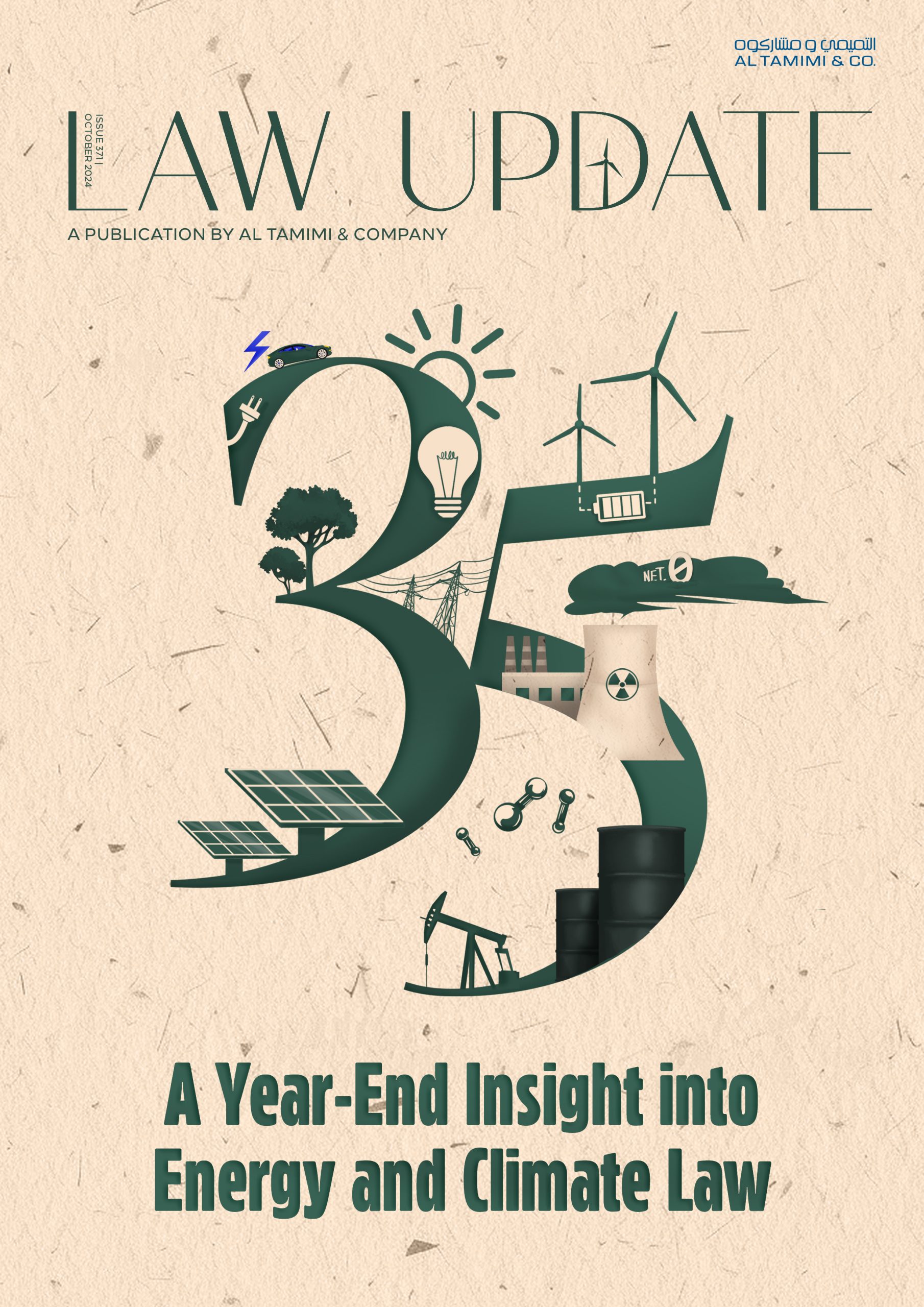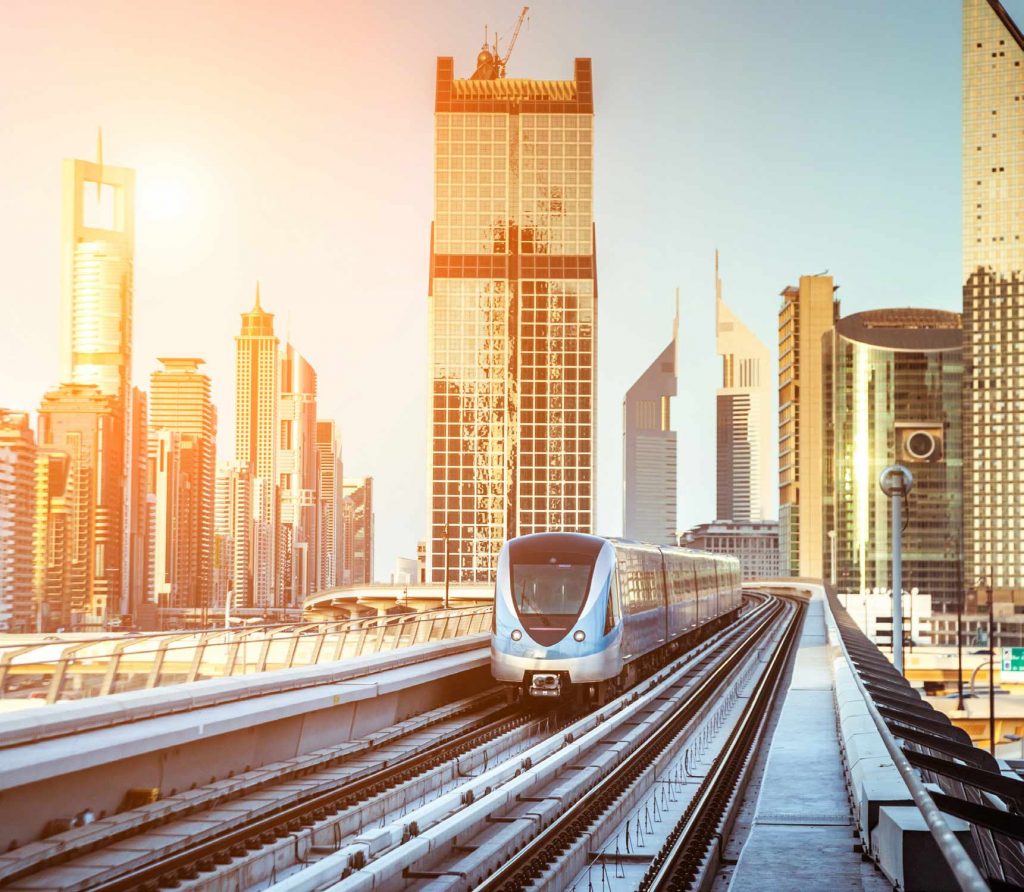- Arbitration
- Banking & Finance
- Capital Markets
- Commercial
- Competition
- Construction & Infrastructure
- Corporate / Mergers & Acquisitions
- Corporate Services
- Corporate Structuring
- Digital & Data
- Dispute Resolution
- Employment & Incentives
- Family Business & Private Wealth
- Innovation, Patents & Industrial Property (3IP)
- Insurance
Find a Lawyer
Book an appointment with us, or search the directory to find the right lawyer for you directly through the app.
Find out more
A Year-End Insight into Energy & Climate Law
This special edition of Law Update, marking Al Tamimi & Company’s 35th anniversary, explores the evolving legal landscape of energy and climate law across the region.
As the Middle East prioritises sustainable growth, this edition examines key developments shaping the future of the sector. From the UAE’s Federal Law No. 11 of 2024 to advancements in green hydrogen, solar financing, and carbon capture technology, we spotlight the innovative strides and challenges defining this critical area.
We also go into Saudi Arabia’s initiatives to integrate carbon capture into its industrial expansion and Egypt’s AFRICARBONEX platform, which underscores the region’s commitment to a sustainable and inclusive future.
Join us as we celebrate 35 years of legal excellence and forward-thinking insights, paving the way for a more sustainable tomorrow.
Read Now
The leading law firm in the Middle East & North Africa region.
A complete spectrum of legal services across jurisdictions in the Middle East & North Africa.
-
Practices
- All Practices
- Banking & Finance
- Capital Markets
- Commercial
- Competition
- Construction & Infrastructure
- Corporate / Mergers & Acquisitions
- Corporate Services
- Corporate Structuring
-
Sectors
-
Country Groups
-
Client Solutions
Today's news and tomorrow's trends from around the region.
17 offices across the Middle East & North Africa.
Our Services
 Back
Back
-
Practices
- All Practices
- Banking & Finance
- Capital Markets
- Commercial
- Competition
- Construction & Infrastructure
- Corporate / Mergers & Acquisitions
- Corporate Services
- Corporate Structuring
- Digital & Data
- Dispute Resolution
- Employment & Incentives
- Family Business & Private Wealth
- Innovation, Patents & Industrial Property (3IP)
- Insurance
- Intellectual Property
- Legislative Drafting
- Private Client Services
- Private Equity
- Private Notary
- Projects
- Real Estate
- Regulatory
- Tax
- Turnaround, Restructuring & Insolvency
- White Collar Crime & Investigations
-
Sectors
-
Country Groups
-
Client Solutions
- Law Firm
- /
- Insights
- /
- Law Update
- /
- October 2018
- /
- Appropriation of Land in Dubai for Transport Projects
Appropriation of Land in Dubai for Transport Projects
 As construction in Dubai continues to progress at a steady rate and in readiness for Expo 2020, it is inevitable that existing infrastructure, particularly transportation related infrastructure, will need to be expanded or additional infrastructure built to cope with increased demand. In order to facilitate the upgrade, expansion or construction of new transport infrastructure, the relevant authorities may be required to compulsorily acquire land owned by a third party that is located in the proposed transport corridor.
As construction in Dubai continues to progress at a steady rate and in readiness for Expo 2020, it is inevitable that existing infrastructure, particularly transportation related infrastructure, will need to be expanded or additional infrastructure built to cope with increased demand. In order to facilitate the upgrade, expansion or construction of new transport infrastructure, the relevant authorities may be required to compulsorily acquire land owned by a third party that is located in the proposed transport corridor.
It is important that land owners are aware of the broad rights granted to the competent authorities to acquire land for such projects and what their rights are in the event of a proposed appropriation of land.
General right to appropriate land in the UAE
Federal Law No. 5 of 1985 (as amended) (“Civil Code”) contains the general right of appropriation, specifically at Article 1135, which provides that:
“(1) No person may be deprived of ownership without lawful cause; and
(2) Appropriation of ownership for the public benefit shall be against just compensation and in accordance with the provisions of the law.”
The right of appropriation in the Civil Code is consistent with the overarching principle contained in the Constitution of the United Arab Emirates (the “Constitution”), specifically at Article 21, which provides that:
“Private property is protected and the restrictions against it shall be specified by law. A person may not be deprived of his/her private property except in such circumstances as may be required by the public interest, in accordance with the provisions of Law, and for equitable consideration.”
“…it is recommended that a land owner, should it become aware of a potential appropriation, provide the RTA with evidence of its likely losses without delay so that these losses can be taken into consideration when the valuation is prepared.”
Who can appropriate land for transportation purposes?
Typically, compulsory acquisition within the Emirate of Dubai falls within the scope of the powers of the Dubai Municipality, but in respect of transportation matters, as at 1 November 2005, the power of appropriation is vested in the Road and Transportation Authority (“RTA”) as a result of the introduction of Law No. 17 of 2005 concerning the establishment of the Roads and Transportation Authority (“Law No. 17”).
In accordance with Law No. 17, the RTA is responsible for “planning and executing road, transport and traffic projects in the Emirate…”. The introduction of Law No. 17 resulted in the rights, obligations, responsibilities and powers of the various departments within the Dubai Municipality, which previously dealt with road and transport matters in Dubai being transferred to the RTA (Article 16 of Law No. 17). The rights transferred included the right to appropriate land, with Article 6(1) of Law No. 17 authorising the RTA to “acquire and lease property… as necessary to perform and execute its work.”
When is appropriation permitted?
In accordance with Article 1135 of the Civil Code, the RTA will be permitted to appropriate land owned by a third party, as required to execute its functions, provided that:
- the appropriation is for “public benefit”; and
- “just compensation” is paid to the owner of the land.
In our opinion, it could provide difficult for a land owner to argue that the proposed appropriation would not be for the “public benefit”, if the appropriation is required to increase the capacity of the transportation infrastructure in Dubai.
 Compensation
Compensation
(a) Entitlement to Compensation
It is reasonable to expect that a land owner should be equitably compensated for the appropriation of the owner’s land and this position is reflected in the Civil Code. As outlined above, Article 1135 of the Civil Code confirms that appropriation of land can only be undertaken on the basis that “just compensation” is paid to the “person being deprived of ownership” (i.e. the land owner).
(b) Calculation of compensation
The Civil Code does not outline the process or principles for determining the “just compensation” payable to the land owner. However, the UAE Ministry of Justice, in providing commentary on Article 21 of the Constitution and Article 1135 of the Civil Code in 1987, broadened the scope of compensation payable noting that regard must be had to the loss of profit and other damage that would result from the appropriation of land.
In Case 6/2009, the Court of Cassation referred to the UAE Ministry of Justice’s commentary when considering the interpretation of Article 21 of the Constitution and Article 1135 of the Civil Code, in confirming that:
“The Commentary to the Civil Code states that in assessing just compensation for land, account will be taken not only of the value of the thing the ownership of which has been expropriated, but also loss of profit and other damage sustained by the person whose property has been taken from him. The effect of that is that the meaning of just compensation is that it will cover all loss arising out of the expropriation of ownership for the public benefit or for development planning purposes…”
Decision 910 of the Dubai Municipality (the “Decision”) also provides a detailed guide on the procedure in place with respect to the compensation regime for land and building affected by compulsory appropriation. This decision outlines the valuation process and provides for two forms of compensation to be paid depending on the value of the appropriated land (if the value of the land exceeds AED 2,000,000, the land owner shall be compensated by substitute land in lieu of a cash payment). Given the RTA is a separate legal entity from the Dubai Municipality, as confirmed by Article 3 of Law No. 17, it is arguable that it is not required to follow the procedures set out in the Decision, however it could look to the Decision as guidance when acquiring land owned by a third party.
Law No. 17 does not set out the procedures for the appropriation of land and the methodology to be adopted when determining the “just compensation” payable and there is no information readily available to the public to assist in understanding the current procedures adopted by the RTA.
In any event, the RTA will obtain an assessment, which may be obtained via the Dubai Land Department, as to the value of the land to be appropriated, with this valuation to assist the RTA in determining the compensation payable to the land owner. It is possible that this assessment will not take into consideration the “loss of profit and other damage” when valuing the land and it is recommended that a land owner, should it become aware of a potential appropriation, provide the RTA with evidence of its likely losses without delay so that these losses can be taken into consideration when the valuation is prepared.
Can the appropriation or level of compensation be challenged?
A land owner is entitled to object to a proposal for compulsory appropriation or the proposed amount of compensation to be paid in light of the appropriation.
Where a land owner wishes to lodge an objection, it must comply with the following process:
- the land owner should file an objection with the appropriate authority and request that it reconsider the need to appropriate the land or the proposed compensation to be paid;
- if the RTA still intends to acquire the land or does not revise the compensation amount to be paid, notwithstanding the objections submitted, the land owner must approach the Dubai Ruler’s Office requesting consent to file a claim against the RTA;
- upon receipt of the request, the Ruler’s Office will serve notice on the parties to visit the Ruler’s Office in an attempt to try and amicably settle the matter;
- should this meeting be unsuccessful in resolving the dispute between the parties, the land owner could file a claim with the Dubai Court (if permitted to do so). If the claim filed by the land owner relates to the compensation to be paid in light of the appropriation, the Dubai Court may obtain an expert opinion as to the true value of the land. If the opinion of the expert differs to that of the Dubai Land Department, the Dubai Court may place more weight on the position of the expert in considering whether the amount offered to the land owner accords with the principle of “just compensation”.
Conclusion
While the possibility of land being appropriated is not an ideal situation for any land owner, the preservation of such rights is necessary to ensure that the RTA has the ability to expand, upgrade or construct additional transportation infrastructure to adequately cope with increased capacity of users over time.
It is not uncommon for government departments to update their procedures from time to time, and therefore, a land owner should seek legal advice regarding its rights at the time, should it receive, or become aware of, a proposal for the compulsory acquisition of its land.
Al Tamimi & Company’s Real Estate Practice provides a comprehensive range of legal services across the Middle East including Dubai, covering all areas relevant to the property industry including real estate ownership advisory and transactional work assistance.
Stay updated
To learn more about our services and get the latest legal insights from across the Middle East and North Africa region, click on the link below.


